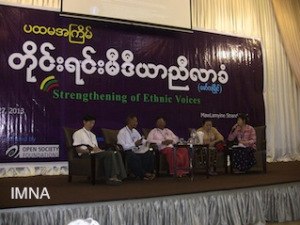Min Thu Tha – Burma News International (BNI) objected to the new Printing and Publishing Enterprise Law (PPEL) that recently passed by Pyithu Hluttaw’s (Lower House of Parliament). If it becomes law it will “threaten” the media in Myanmar, according to BNI.
 “We can’t report what is happening in the country freely” said BNI’s Development Officer Nan Paw Gay who called the wording of section 7 that restricts the content of what may be published as “too broad in its scope and unclear”.
“We can’t report what is happening in the country freely” said BNI’s Development Officer Nan Paw Gay who called the wording of section 7 that restricts the content of what may be published as “too broad in its scope and unclear”.
The PPEL bill that gives the government’s the same control over the print media as with the 1962Printers and Publications Act (PPA) introduced under Gen Ne Win is seen as a major throwback for media reform in the country. The Ministry of Information (MoI) is in charge of issuing and revoking media licenses for printers, publisher and media. In order to get a license requires an ‘acknowledgement certificate’ from the Registration Officer, who is the director of the Copyright and Registration Division within the MoI.
Operating without license or other infractions like failing to abide to the bill loosely written wording will cost hefty fines of five and ten million Kyats (USD $5,670-$11,340), according to section 20.
Fear of prosecution will affect “ethnic minorities’ areas where the development of media has been slow”. “We won’t be able to gather facts and information regarding human rights abuses and regional conflicts” and “report about those freely and easily” leading to “one-sided news, same as before”, Nan Paw Gay said.
“This law grants MoI control over registrations of media outlets. Because of this, it’s a big threat for media freedom.”
The bill also uses vague wording that bans criticism of Burma’s 2008 Constitution.
Burma News International is the umbrella group for 11 news groups both in Burma and neighboring countries.
Members of the Interim Press Council (IPC) said they would quit if the bill becomes law. The IPC was formed in September of last year to work on a draft media law and develop the foundations for a media council among other things. But most of their recommendations were ignored. Both MoI agreed to make separate drafts of the press law but only MoI’s proposal was reviewed.
By presenting this bill to Parliament the MoI is breaking a gentlemen’s agreement that they wouldn’t back something that journalists were objectionable too, according to the IPC.
There was hope that the country would finally get freedom of the press after restrictions on the media were lifted after the Censorship Board was abolished last summer. The country last experienced press freedom following independence of Britain in 1948 until Gen Ne Win took power in ’62.
The draft of Printing and Publishing Enterprise Law (PPE) that Pyithu Hluttaw will be considered by Amyotha Hluttaw (Upper House of Parliament). If approved by Upper House it will be signed by the President becoming law.



